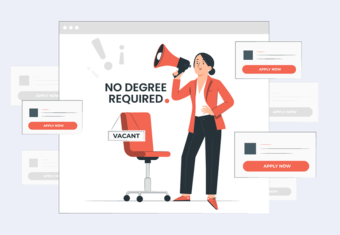If you’re gearing up for a job search in 2024, keeping an eye on the latest trends in job hunting can help you get an idea of what’s changing and why — and also give you a competitive edge over other candidates.
Here are the 8 most important job search trends to watch for this year:
1. AI is the new matchmaker in job searching
With a reported 99% of Fortune 500 companies already using AI in recruitment, the trend is clear: Artificial Intelligence (AI) has become an essential tool in the hiring process.
In fact, a 2024 Workday report found that 70% of people leaders consider AI crucial for HR success over the next five years, especially on candidate matching and AI-driven career pathing.
AI isn’t just being used by HR and business leaders either. Both job seekers and recruiters are now using AI tools to save time and boost productivity. For instance, job seekers are using it to generate cover letters and resumes, and LinkedIn recruiters are creating job ads with ChatGPT.
But while AI promises to bring important benefits — from more accurate job matching to reducing racial bias in hiring — it also has its downsides.
For example, AI-generated resume and cover letter content can be too generic and contain false information which might get you in trouble during an interview. A lack of human judgment could also lead to poor hiring decisions, and research shows that AI tools can actually learn and encourage these biases rather than eliminate them.
How you can get ahead
As many recruiters use AI to scan resumes, you’ll need to optimize your own resume to get noticed. To do so, fix up your resume by ensuring you have:
- clear, standardized formatting
- keywords related to your field and the job description throughout the text
- the most commonly used job titles used in your field as your listed positions (assuming they’re roughly the same)
AI generative software chatbots like Bing and ChatGPT also have room for improvement in many areas, like personalizing resumes. But they certainly can help you create ready-made templates and drafts that you can customize more on your own.
2. Remote and hybrid opportunities are becoming more competitive
Although remote and hybrid job opportunities continue to attract significant interest, more return-to-office policies mean that these opportunities are becoming increasingly scarce.
Buffer’s 2023 Global State of Work Report suggests that 98% of people want to work remotely at least some of the time, with 26 to 41-year-olds being the most interested in remote work in the US, and those aged 42–57 close behind.
Since working remotely requires a diverse skill set (e.g., adaptability, good work ethic, tech literacy), you’ll have to showcase these skills to show you’re comfortable with this new shift.
How you can get ahead
- Remote-ready your resume: Refresh your resume with top skills for remote workers to stand out among the competition, such as time management, adaptability, self-motivation, and tech skills.
- Find remote work opportunities: While you can find remote opportunities on the usual job search suspects (LinkedIn, Glassdoor, Indeed, etc.), heading to sites designed specifically for remote jobs can increases your chances of landing a good one. Try We Work Remotely, RemoteJobs.io, or by searching Facebook Groups for digital nomads or jobs in your niche (e.g., design.)
3. Data literacy and tech-savviness are must-have skills
Being tech-savvy and knowing how to navigate new tools and software is now a non-negotiable for most jobs.
For example, there’s recently been a surge in skills requirements in areas like artificial intelligence (AI) applications, advanced data analytics platforms, and cloud computing services. These skills represent the next level of tech know-how and go beyond standard tools like using email platforms and spreadsheets.
In fact, a Resume Genius study showed that 42% of hiring managers believe IT, software development, data analysis, and project management are the most critical skills to help future job seekers succeed.
As a result, hiring managers are on the lookout for professionals who:
- are already skilled in these areas and can immediately contribute to a workplace
- may not be experts but are highly familiar with technology in general and have a proven track record of quickly adapting to new tools and systems
IBM is one of many companies that recently introduced skills-based hiring, which involves hiring candidates for their specific skill sets and completely ignoring their educational background.
This hiring method shows that no matter what your current experience and background is, developing data literacy and technical know-how are key to securing promising career opportunities in 2024.
How you can get ahead
To stay ahead of other top applicants, proactively learn (and then highlight) the most in-demand skills related to your own career on your resume.
Try taking certifications and online courses to get more comfortable and learn about the field. Don’t forget to add these details to your resume and LinkedIn profile to show employers you’re a good fit for roles that require a tech or data-driven background.
4. Social media is an increasingly helpful tool for job hunting
86% of job seekers now use social media in their job search — ranking as the third best way to find new jobs after job boards and employee referrals.
There’s also been a shift toward leveraging social platforms to land career opportunities by posting relevant content and building a personal brand on platforms like LinkedIn, Instagram, or X (Twitter). Refining your social profiles can help you develop authority as an expert in your industry and impress potential employers.
Employers also increasingly post jobs on social platforms, so it’s ideal to be on these platforms to increase your odds of finding great opportunities.
How you can get ahead
Remember to take some time before sending out your job application to clean up your social media profiles.
For example, ensure your LinkedIn profile is professional by adding a clear, professional headshot as well as industry-relevant keywords.
Companies often share updates and achievements on social media, so use these to uncover their values and culture to tailor your applications and interviews.
5. Employees want more than just a paycheck
The American Staffing Association (ASA) reveals that 80% of US adults view opportunities for professional development and training as important when accepting a new job. This pattern means that modern employers must offer more than basic salary and benefits to attract and retain top candidates.
Development programs help employees improve their skills. They might include:
- Training
- Learning and courses
- Coaching
- Mentoring
As well as boosting employee satisfaction, offering development opportunities can increase motivation, productivity, and even profitability. And when it comes time to move onto the next opportunity, employees who are given time to develop skills become more attractive to future employers and should find it easier to increase their salary in the future.
How you can get ahead
As a job seeker, search out organizations that value learning and development and discuss the options during the hiring process.
Also, add any programs you’ve undertaken to your resume and highlight any relevant training you’ve completed during your interviews to make yourself more marketable as an applicant.
6. Job applicants want to find a workplace that resonates with their values
More than ever before, there’s a noticeable trend among a segment of job seekers who are prioritizing company culture and values in their employment search.
A workforce survey by CNBC and Momentive supports this, revealing that 40% of workers would consider quitting their jobs if their values openly didn’t align with their employer’s.
Ways to reduce burnout and create more appealing work environments for employees is a hot topic in the news recently.
For example, some companies have recently trialed new work models like the 4-day work week and the 9/80 work week, which offer shorter and more flexible working hours.
How you can get ahead
In this case, it’s up to job seekers to do their research and choose companies that align with their individual needs.
To ensure this alignment, research the company’s culture thoroughly before accepting its offer.
You can also go further than researching the company website. Check its social profiles like LinkedIn, forums like Reddit, and reviews from real and past employees on job search sites like Glassdoor.
To get a better idea of whether a workplace will suit you, look for more information about their:
- company benefits package, including paid holiday, insurance, and wellness
- office culture
- company’s stance on work-life balance
- frequency of salary reviews
7. Side hustles are the new norm
According to Bankrate, 39% of US adults have a side hustle. A growing trend is that more workers are finding alternative ways to make additional income, find more fulfillment alongside work, and become more financially secure.
Job seekers may also enter into temporary, flexible, or freelance work while they’re searching for a full-time role.
Building a side hustle doesn’t only bring in more money. Enhancing skills can make job seekers more attractive to potential employers too as it shows they have good time management skills and self-motivation to do more than one job at a time.
Learning a new skill as a side hustle might even help you progress in your 9-to-5. For example, if you work in a graphic design role, you could learn programming on the side to help you make extra money and expand into a developer role.
Popular side hustles among job seekers might include:
- offering existing skills in a freelance capacity (e.g., providing digital marketing, design, copywriting services)
- content creation and influencing: building an audience on social media platforms (e.g., YouTube) and making money through brand deals, ads, and affiliate marketing
- selling products online (e.g., sourcing or hand-making products and selling them on marketplaces like Amazon or Etsy)
How you can get ahead
Finding a side gig might involve applying for contract roles on job boards, reaching out to people who might be interested in your products and services on LinkedIn, or even creating your own website and running affiliate advertisements.
8. There’s even more of an emphasis on soft skills
With growing numbers of flexible, remote, and hybrid positions, soft skills like clear communication, teamwork, and time management are vital for these different types of workplace environments.
Also, with AI taking over a lot of manual work, soft skills are gaining importance because employers need creative, adaptable individuals to leverage and work well together with this technology.
Employers are also looking for employees with leadership skills and emotional intelligence.
For instance, Dominique Vatin, Career Expert at Resume Genius, said that companies today are looking for job applicants who aren’t only convincing — but also kind and empathetic. She says,
I always advise job seekers to showcase their emotional intelligence by actively listening and responding thoughtfully not only during interviews, but in all of their professional communications. Whether it’s a cover letter, reaching out over LinkedIn, or networking at an event, tailoring your communication style to different audiences while remaining authentic and open towards others demonstrates an ability to empathize and adapt, which are all key components of emotional intelligence.
Dominique Vatin, CPRW and Career Expert at Resume Genius
How you can get ahead
To showcase a soft skill like adaptability, consider incorporating real-life examples into your resume and cover letter by illustrating times where you successfully navigated change or embraced challenges.
For example, can you think of a time you resolved a conflict between two colleagues in your team or even in a personal setting? What about a time you dealt with an unexpected problem during a project?
Sources
Learn more about the latest job search trends using these resources.
- BankRate, “Survey: 39% Have a Side Hustle, and 44% Believe They’ll Always Need One”
- Buffer, “State of Remote Work 2023”
- CNBC, “Most Workers Say Their Salaries Are Lagging Behind Inflation”
- DemandSage, “41 AI Recruitment Statistics For 2024 (Latest Data)”
- Forbes, “AI Bias In Recruitment: Ethical Implications And Transparency”
- Fortune, “Fortune 500 Companies Are Using AI to Screen Candidates. Here’s How Not to Get Rejected Immediately”
- Fox Business, “Soft Skills Are Critical Today: Here’s Why Job Recruiters Value Them so Much”
- Gallup, “What is Employee Engagement and How do You Improve It?”
- LinkedIn & American Staffing Association (ASA), “Statistics Say Workers Want Job Training and Career Development”
- Pew Research Center, “Most Americans Say Racial Bias is a Problem in The Workplace. Can AI Help?”
- Resume Genius, “4 Reasons Why AI Isn’t The Solution to Your Resume Needs”
- Resume Genius, “Why a 4-day Work Week Won’t Decrease Burnout (Survey Data)”
- Resume Genius, “The 9/80 Schedule: Is it a Win-Win for Workers & Businesses?”
- SHRM, “Job Seekers Crave Remote Work, Even as Remote Jobs Decline”
- TalentAdore, “Top 10 Recruitment Trends for 2024”
- Workday, “A Human-Centered Approach to AI in The Workplace”
About Resume Genius
Since 2009, Resume Genius has combined innovative technology with leading industry expertise to simplify the job hunt for people of all backgrounds and levels of experience.
Resume Genius’s easy-to-use resume builder and wide range of free career resources, including resume templates, cover letter samples, and resume writing guides, help job seekers find fulfilling work and reach their career goals. Resume Genius is led by a team of dedicated career advisors and HR experts and has been featured in The New York Times, Forbes, CNBC, and Business Insider.
For media inquiries, please contact us.














